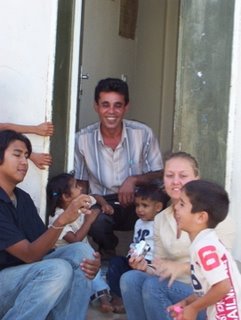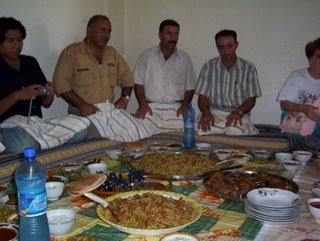Tuesday, October 10, 2006
Below is a description of my work and the presentation formats I'm comfortable with. Check it out and make note of what I am and am not willing to do. I've decided to post this information just to give potential hosts a better idea of what I can do and what I can't – I've been getting a number of requests for formats that I'm not able to provide, so I thought this might be helpful for everyone.
Thanks for helping to get the story of Palestine out to the world!
Coming Soon! Hopefully, after a bug in my blog is ironed out, I'll be embedding a calendar in the side bar to show when I am available for presentations. Check it out, comment, call or send me an email and we'll get a presentation scheduled for you!
Presentation description:
Portland resident Joy Ellison has returned from spending three months
in the West Bank supporting Palestinian nonviolent resistance. Joy
Ellison is an Earlham College graduate with a degree in Peace and
Global Studies and has traveled to many places besides Palestine,
including Northern Ireland and Bolivia. This summer marked her second
trip to Palestine, where she has spent a total of 5 and half months
working with Christian Peacemaker Teams, International Women's Peace
Service, and the Holy Land Trust. She is planning to return to
Palestine this year to continue working with Christian Peacemaker
Teams.
With photographs, maps, and video clips, Joy's presentations attempt
to bring her experiences in Palestine to life for other Americans.
She focuses on explaining the basics mechanisms of the Israeli
military occupation of Palestine and sharing how Palestinians,
Israelis and international partners are building peace through
nonviolent resistance.
I'm happy to give presentations in the following formats:
· Formal presentations: I have prepared a 45 minute – hour long powerpoint presentation with pictures and map to illustrate my experiences. I am very happy to give this presentation to groups of any size and answer questions. I think that this presentation is the most clear and informative and works well for groups with considerable or very little knowledge of the situation.
· Informal question and answer secessions: I'm very happy to speak about my work very briefly (5-10 minutes) and answer questions or participate in a discussion with a group of any size. I find that this is a good format for discussing both the political and the personal aspects of my work and works well in college classrooms, Sunday Schools, and homes.
· Host a video presentation: I have a small selection of videos about Palestine and I am very happy to introduce myself, show a video and answer questions afterwards.
· Elementary school classrooms/children's religious classes: I have designed an hour-long presentation about live in Palestine appropriate for first graders through 5th grade. The presentation focuses on the lives of Palestinian children and Palestinian culture, religion, and food. Presentations can be shortened if needed.
· Spoken messages/sermons, etc.: I am willing to prepare a message, sermon or other talk for religious gatherings or other large gatherings.
· Nonviolence trainings: I love to give nonviolence trainings focused on exploring what it means to use nonviolence to build peace and justice. Trainings, however, always require preparation, so I do request an honorarium based on the amount of preparation time I spend.
· Interviews: I am always willing to give interviews. I have selection of articles that I have written on Palestine that I can provide for publication and re-publication.
· Table/present information: I am occasionally willing to set up information and flyers about my work and the situation in Palestine, but I am selective when choosing a venue/schedule for such an event. I am, however, always very happy to pass on information so that other people can pass out information themselves.
I prefer not to:
· Lead people in mediations/prayers/silence: I'm often asked to lead times of reflection or mediation, but I strongly prefer not to do so. Because I take these times of reflection seriously, I find preparations for them to be very time consuming. I have one pre-prepared outline for such a presentation. I am only willing to led mediations if this outline will fit the desired format.
· Participate in a debate/panel discussion on Israel/Palestine: My work is focused on sharing my experiences and discussing nonviolent peacemaking, not debating the issues. I feel that there are other people who are better suited to that and I'm not sure that the format gets us anywhere. I have presented alongside other peace activists in an informal question-and-answer session and I am happy to do similar presentations.
· Tap-dance :-)
Find God in the Darkness
Based on a sermon given at West Hills Friends, Portland Oregon
Lately, I've realized that very few people actually understand what
people like me are doing working in Palestine. Certainly there are
many people who've never heard of organizations like Christian
Peacemaker Teams or the International Solidarity Movement, but that's
not what worries me. It's the way our friends and supporters and
often the way we ourselves describe our work that's begun to disturb
me. Often people like me who work supporting Palestinian nonviolent
resistance are described as "active peacemakers" or "people standing
in the way of violence." They say that we're "standing in solidarity
with the oppressed" or "shining God's light in the darkness" or, my
personal favorite, "trying to save the world."
I suppose all of that is true, to some degree, and I find it deeply
flattering. But I think these descriptions are also very convenient.
They make the work we do seem difficult and that in turn allows people
to react to it in one of two ways: first, these descriptions makes it
very easy for the listener to say, "why, I could never do something
like that." Secondly, and this is what concerns me more, these
descriptions make our work seem very important and even gallant. They
create a dangerous potential for nobility and self-righteousness.
They also shield us from the questions that the Israeli military
occupation of Palestine poses and make it easier for us to avoid
questioning ourselves. They also prevent us from fully confronting
the despair always present in situations of oppression.
So, let me tell you what we, the people who serve in organizations
like Christian Peacemaker Teams, really do. I think that you'll find
in the reality is less gallant and more humble that we might wish for.
We let Palestinians feed us. We accept gifts from people who cannot
afford to give them. We meet people and try not to mispronounce their
names. We explain to many people that we don't know President Bush
personally, but we'll tell everyone we do know their story. Most
importantly of all, we act in a way that allows people to preserve
their dignity.
We participate in the daily realities of the oppressed – in this case
the Palestinians – as much as outsiders of varying degrees of
privilege ever can. Sometimes we stand in line at checkpoints for
hours. We try to convince soldiers to let people go home or to the
grocery store. We sweat. We grumble (at least I do). We look for
that of God in other people.
We spend money in places that no one else goes. We smile at people
whose lives are hellish. We play soccer with children.
We are a presence. We care. And it's hard to know if we're doing a
lot of good, but we find it difficult to stop or to do anything else.
Over this summer, I set aside time to study Arabic so that my work in
Palestine might be more effective and more respectful. On a typical
day, I might have found myself traveling to Jerusalem on an errand.
I'd probably be in a bit of a hurry, but I'd visit my friend Mahjadee who
owns a dying tourist shop on Manger Street. Talking would turn to
drinking coffee, which would turn into an Arabic lesson and buying a
present from my mom. An hour later, I might finally leave Bethlehem
for Jerusalem. I'd try my best to act human-ly to the Israeli
soldiers who check my ID at the checkpoint, though I'm not sure how
one does that when a glass window and a wall of silence separates us.
I'd run my errands in Jerusalem and then I might buy prayer beads for
my friend Marwan, who always smiled sadly whenever I told him I was
going to Jerusalem. I'd find a shop and choose a piece of Jerusalem
to bring back to Marwan, who hasn't been able to travel to his holy
city, only 5 miles from his home in Bethlehem, for 12 years. I'd let
the shop owner rip me off, to the degree I could afford. Then I'd get
back on the bus, show my ID again at the checkpoint and go home to my
host family. What did I accomplish? I'm still not sure.
Or maybe, on a day I was feeling strong and resilient, I might visit
my friend who has the misfortunate to work next to a holy site for
Christians, Muslims, and Jews: Rachel Tomb. Because of its proximity
to the tomb of Rachel, Jacob's wife, the Israeli army has surrounded
his shop with the 25ft high cement Annexation Wall. The Wall snakes
inside Bethlehem to swallow up the tiny shop and all of his business
with it. His shop is dying now and when I would come to visit he
would tell me his problems and cry because the situation had stripped
him of everything and is now chipping away at his last possession: his
dignity. I would drink tea, say hello, and try to make him let me pay
my bill. All I could do was let him know that I knew he was there and
give him a few more shekels to scrape together to feed his family.
Sometimes, usually even, our work seems more direct. Christian
Peacemaker Teams volunteers accompany children on their way to school.
CPTers stand in the way when settlers throw rocks at them. We try
to find ways to support the Palestinian-led nonviolent resistance
movement. We sometimes serve as a bridge between Israeli and
Palestinians activists and we attend demonstrations against the
Israeli Annexation Wall. On what might be called an "exciting" day
(and those are the days one learns to fear) international activists
might grab or pile on top of Palestinian activists to un-arrest them.
When we are successful, we know we've helped to make sure a mother or
father or beloved child will go home safely, instead of off to spend
years in an Israeli jail. Like all activists, we have many projects:
we create documentaries, reports, and activist resources. We write
letters, paint signs, and work very hard. Always, we are writing
about what we see. We're always trying to say whatever we need to say
to help our friends understand what is happening, to make them care,
and insight to them to do something.
In my experience, these simple actions are what comprise the reality
of what we are doing when we work in solidarity with Palestinians. I
think, though, that in all of this, while we may want desperately to
believe we are changing the world, and I still have faith that we are,
we are also looking for God in the dark places. We may like to think
of ourselves as peacemakers Jesus called blessed, but we have also
become blessed because we are poor in spirit and blessed because we
mourn.
When I returned to Palestine this summer, my prayer was that I would
see God in the soldiers and Israeli officials I came in contact with.
As I stepped off the plane and tried to steady my nerves for the trip
through Israeli security, my prayers were immediately answered. The
girl behind the glass was about my age and pretty. It was easy to see
God in her. I didn't expect to continue to see God in the eyes of
Israeli soldiers, but I did. And the truth is, I still don't know
what to do with the piece of God I saw so clearly in those young
soldiers. Would Jesus carry a gun? I still don't think so. But I
saw him doing just that.
What do we do with experiences like this? It's hard to see clearly in
the dark. But sometimes it is in the dark that I am finally able to
see God.
Sunday, September 03, 2006
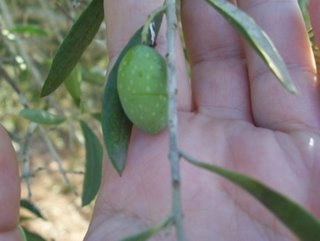
I was lucky enough to be able to travel to Jenin to visit the PFTA and learn more about their programs and daily life for Palestinian farmers. Here is what we saw:
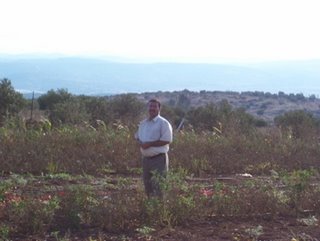
After visiting our host's home, we drove to their fields to see the olive groves and develop a better understanding of the lives of Palestinian farmers and the work of the Palestinian Fair Trade Association.
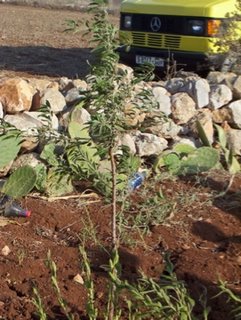
This olive tree was planted as a part of the PFTA's Trees for Life Program. Through this program, a portion of all of the PFTA's sales go to plant new olive trees to replace those destroyed by the Israeli military occupation of Palestine and empower Palestinian farmers. Between Tree Day (Feb. 15th) and Land Day (March 30th) thousands of Trees for Life are planted in Palestine. All of the recipients are members of the PFTA and priority is given to small farmers, women land owners, brand-new young farmers, and farmers who have lost trees in the Israeli occupation. Because olive trees can live for hundreds of years and provide important income for Palestinian families, trees like this one are an important form of empowerment and a meaningful link between Palestinian farmers and the global fair trade movement.
 From visiting the fields and receiving pounds of grapes, we visited the Palestine Fair Trade Association's olive oil bottling factory.
From visiting the fields and receiving pounds of grapes, we visited the Palestine Fair Trade Association's olive oil bottling factory.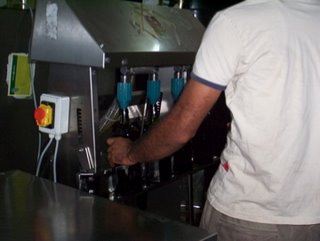
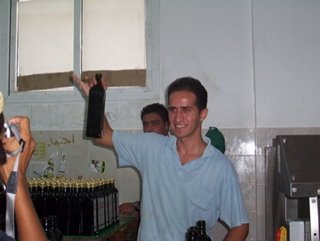
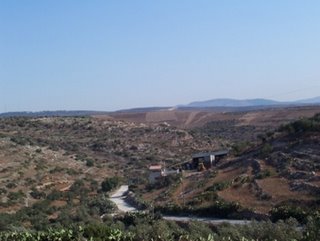
It wasn't easy to say good-bye to the beautiful Jenin valley. But at least we can take Jenin's bounty with us. The Palestine Fair Trade Association has partnered with organizations to ship to UK, Canada, Australia, Japan, the USA and other countries. Check out the Palestine Fair Trade Association website for more information and become a part of the fair trade movement. You will never find a better tasting revolution.
Saturday, September 02, 2006
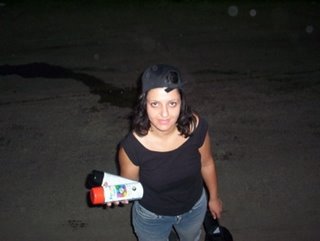
Frankly, this seems very silly and I'm not sure why I'm posting it. But these are pictures from our little adventure tagging in Bethlehem. That's tagging the Annexation Wall, I mean. Apparently, the hiss of a can of spray paint lifts the occupation-blues better than just about anything else.
I don't think one really needs an excuse to leave your mark on what is literally one of the largest instruments of oppression around, but we still had one. Viv, a friend of mine from Beit Jala, was leaving Palestine for an exciting and important peace-educator position in the U.S. We wanted to help her say goodbye to her home. But when my friend Francisco (names changed to protect the innocent) told me we'd be tagging the Wall near Rachel'sTomb, I started to have some second thoughts.
Rachel's Tomb, for the uninitiated, is an important site for Christians, Muslims, and Jews and is located inside Bethlehem. The Wall runs around it, snaking into Bethlehem. It's where the Israeli army tends to hang out. That makes it one of the most, shall we say exciting places to write on the wall in Bethlehem. But the blank, clean wall was simply irresistable. Viv asked the guys who own the gas station next to Rachel's Tomb if they minded. They said, "yalla (go ahead), just stay out of sight of the watch tower" and we began. And once you hear the sound of spray paint coming out of its can, soldiers just don't seem as scary.
(I wish these photos were better - taking pictures at night is never easy.)
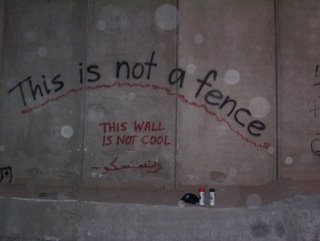
"This is not a fence" because sometime you have to point out the obvious
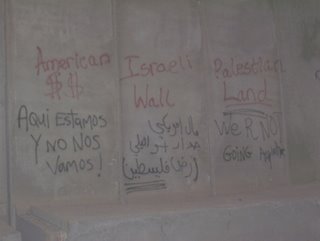 "American $$, Israeli Wall, Palestinian Land" and "Aqui Estamos Y No Nos Vamos, We R NOT Going Anywhere!"
"American $$, Israeli Wall, Palestinian Land" and "Aqui Estamos Y No Nos Vamos, We R NOT Going Anywhere!"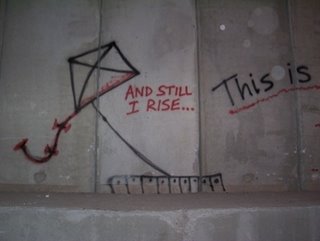 "And Still I Rise" by Francisco
"And Still I Rise" by Francisco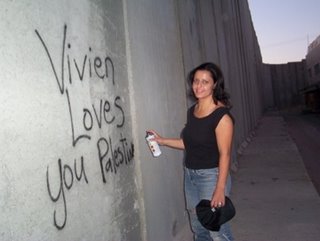 Viv says her goodbye
Viv says her goodbye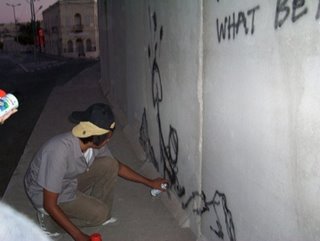 Francisco paints a picture of someone digging under the wall. Its a lovely painting; wish I had a better picture.
Francisco paints a picture of someone digging under the wall. Its a lovely painting; wish I had a better picture. 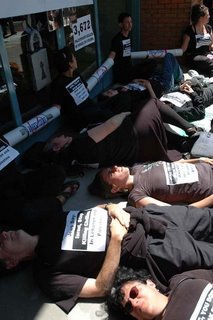
I just learned that over the last month a series of nonviolent actions resisting the occupation have taken place. But these demonstrations haven't taken place in Palestine: the resistance has finally come to the United States! And Jewish Americans are the force behind these actions.
On August 22nd, coordinated actions took place in Philadelphia, San Francisco, and New York. A few week ago, activists demonstrated in Boston and I understand that other actions will be taking place soon. To follow these inspiring demonstration, go to jewishconscience.blogspot.com/ Here are some more links to check out:
Philadelphia banner drop:
http://phillyimc.org/en/2006
San Francisco lock-down at Jewish Federation:
http://freckle.blogs.com/ (Thanks to freckle.blogs.com for the image on this entry.)
New York die-in at Penn Station:
http://nyc.indymedia.org/en
Boston Die-in:
http://boston
And remember what one action participant had to say: "The U.S. gives more than $10 million to Israel every
single day, most of which is used militarily... You don't have to be Jewish to stand against Israel's war crimes! (But it helps with the banners)" Here's to more inspiring actions!
Friday, September 01, 2006
Well, Occupied Voices, a periodic feature here at "I Saw it in Palestine" is back. And this time I want to point you towards a blog that I really enjoy reading: Musings of a Palestinian Princess The writer of this blog, Lucy, is "just your average princess, just under occupation." Lucy blogs from Bethlehem, usually, and I'm disappointed that I didn't get to met her while I was there. That's the sort of blog that "Musings of a Palestinian Princess" is: the sort that makes your want to actually met the person writing it. Check it out, yo.
Tuesday, August 29, 2006
Some upcoming events and oppertunities in the area
In many ways, I work the hardest for an end to the occupation while I am at home. Over the next few months I'll be speaking extensively about Palestine and involved in other projects. There are a couple of events and opportunities that I want to make sure you're aware of, especially those of you living in the Portland/Vancouver area.
First, this Friday, Sept. 1st at 6:00 pm I'll speaking on the Bread and Roses show on KBOO Radio! In Portland and Vancouver, you can listen at 90.7 FM, or any where the world over, you can listen online at www.kboo.fm Pretty cool!
Second, on Sept 16th, the slice of life in Palestine is coming to Vancouver, Washington. A life-sized replica of the annexation wall will be presented at the Vancouver Peace and Justice Fair. And we need your help! To make this unique public education opportunity a reality, we need people willing to help us set-up the wall and take it down. Super-human strengthen is not required - just the ability to follow directions. And if giving instructions is more your style, consider helping out with at mock checkpoint I'm working to organize. I'm looking people willing to impersonate both Israeli soldiers and Palestinians in an effort to give people an idea of what checkpoints are like. If you're interested in helping with either set-up and take-down or with the mock checkpoint, please don't hesitate to drop me an email (or comment). We need all of the help we can get!
Thirdly, as always I'm looking for places where I can speak about my experiences in Palestine. Last year, I was able to speak to a variety of audiences, from church groups to high school classrooms to living rooms. I'm very happy to speak almost any where - but the sooner I can get presentations scheduled the better. Drop me an email (or comment) if you're interested.
Wednesday, August 23, 2006
Gaza After Disengagement
http://ifamericansknew.org/about_us/gaza.html
PS: I'm home safe after absolutely no hassle at the Tel Aviv Airport. Humdillah!
Wednesday, August 16, 2006
I wanted to include this link to an old CPT report that describes the sort of peace process I believe stands a chance of ending the occupation. While I hope there will be a time when political negoitations work and when dialogue, or a truth and reconciliation commission, are appropriate in Palestine and Israel, I feel this is not it. The pressure of injustice is simply to great and those that want to make peace need to struggle for justice.
This piece talks about Israeli and Palestinian activists working together and becoming the "other peace process." Take a look: http://www.cpt.org/archives/2000/apr2000/0006.html
There are no words for how I feel leaving Palestine for the second
time. I don't have the vocabulary to describe the way my heart is
broken apart by a need to stay here - to sit on the land, to hold the
hands my friends, to climb into an olive tree, to refuse to move - and
a desire to escape the madness of this occupation. I don't want to
keep looking into the eyes of young men and women who stand with guns
at the checkpoints. I don't want to look at the pictures of dead
children and demolished houses shown on television. I don't want to
listen to my host father describe how difficult is it for the
Christian families in Beit Sahour sell their olive wood carvings. I
don't want to see how everything gets worse every day. I don't want
to continue feeling so powerless and so ineffectual.
I'm ready to go home, to talk about what I've seen, to renew my spirit
somehow. I'm ready to see my Palestinian American friends who can no
longer come home because of new Israeli regulations. I'm ready to see
my own family. But I know when I come back to Palestine again, it
will be worse. The Wall will be bigger, the land will be smaller,
unemployment will be higher. And the coffee will still be delicious,
the hospitality unparalleled, and hopefully the children will still
smile. My heart will be ripped out again when I return to Palestine,
but I know I can't stay away.
This week has been an endless goodbye. I'm desperately trying to fill
up the time with anything that will distract me, but it's not working.
I can't escape the way I'm feeling. I've learned what it means to
pray without ceasing. I keep crying out for something to change, for
every person, every shop and organization to some how survive until I
come back to see them again. And I pray because I feel like there is
nothing else I can do.
I try not to write sad things. There is so much of that already being
written that I just want to write about hope and, in a small way,
love. So maybe I should try to write something hopeful here: I'm
still hopeful because all of us are still fighting. Here in Palestine
and a few people in Israel and around the world, we're still
struggling for justice and peace. I will come back to Palestine and
while I am away, I'll work hard for my friends here. No night can
last forever. Someday this occupation will have to end.
Monday, August 14, 2006
The group issued a press release stating their motives which is translated below:
The international law requires of every human being the duty of resistance to war crimes using every possible means. At this moment, when the rockets are falling, the war crimes are committed, the victims buried, it is time to fight to stop the war.
The activists are carrying a clear message: Stop civilian killings; Stop the war crimes; Stop the Israeli government criminal policies.
It is the duty of every soldier to refuse to serve orders which are war crimes. The support by the Israeli people of this criminal government means they are participants in committing these war crimes.
The number of dead is continuously increasing. The attacks by Israeli air force are planting death, destruction and hate. In Palestine, the occupation continues killing and torturing Palestinians. The civilians of Northern Israel are used as human shields and are paying their lives as a price to serve the ego of generals who are even unable to acknowledge failure and defeat.
The war crimes are committed everyday, hundreds of kids have been killed. The number of those killed is over a thousand. There are tens of thousands of injured and over one million refugees and Israel continues the air strikes, the killing, the destruction, and the annihilation in order to prove who is powerful in the region.
We repeat and we say what is known for everyone; there is no military solution. We are calling on the Israeli government and its people to wake up and behave in a moral way.
We must stop the war machine and the destruction. we demand an immediate ceasefire, an exchange of prisoners, and the release the political prisoners in Israel.
Call Out for Stories of Palestinian Nonviolent Resistance
Friends, I'm currently living in Bethlehem and I'm volunteering with a
Palestinian organization called the Holy Land Trust. We're working to
put together a web resource center on Palestinian nonviolent
resistance. We're almost ready to launch the site, but we want to
give members of the movement a chance to submit articles and links
that you think should be included.
We're looking for stories of nonviolent resistance actions. The
purpose of this website is to provide an introduction to the
resistance movement that anyone can understand. We're most interested
in dynamically written stories of nonviolent actions, focusing on the
actions of Palestinians and their supporters, rather than the terrible
responses on the Israeli army that we know always take place. We want
to highlight, as much as possible, stories written by Palestinians,
but please don't hesitate to submit any story. Multimedia sources –
videos, audio, pictures, etc – are also welcome.
If you have a story, video, or link you would like to be posted on the
website, please feel free to send it to me at jubilus AT gmail DOT
com. Weblinks are the easiest resources for us to work with, but
previously unpublished material is great as well. Please include, as
much as possible, all relevant information – who, what, when, where,
why, etc.
Thank you so much for your help creating this resource! Feel free to
pass this request on to anyone you feel might be interested.

